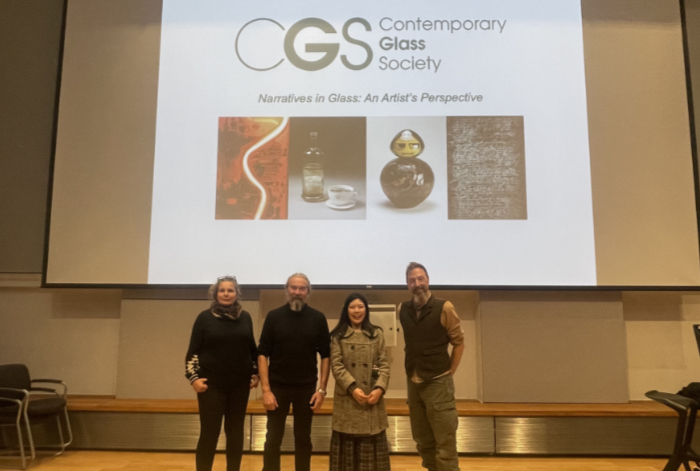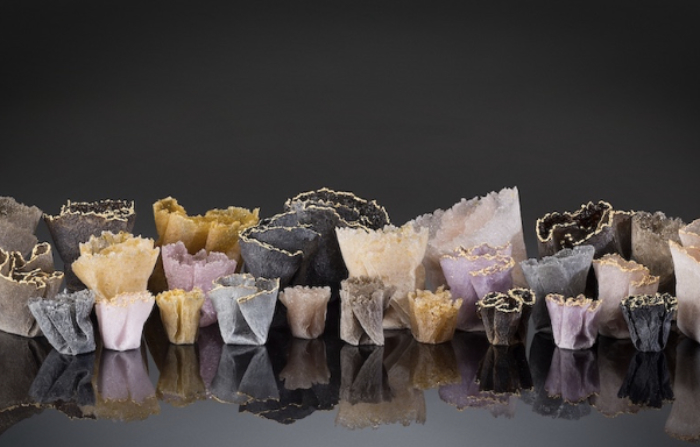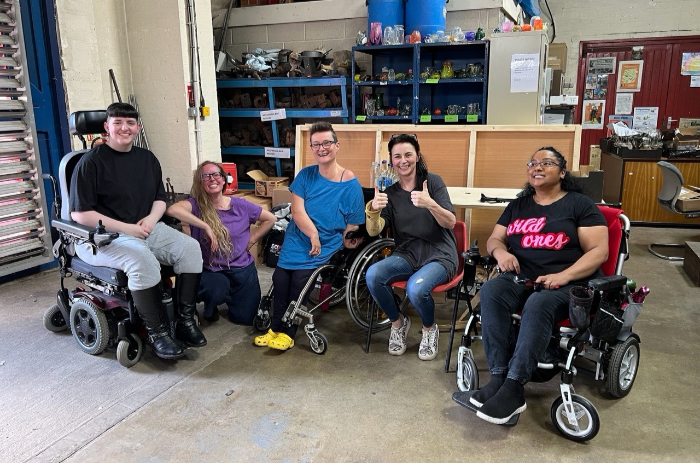
Disability and Inclusion Pilot at International Festival of Glass
At the 2022 edition of the International Festival of Glass (IFG), part of the funding from Arts Council England was allocated to a disability and inclusion pilot project. Project Producer for this initiative, Jaqueline Cooley, explains how it came about, what was involved, plus lessons learned for the future.
The IFG, held in the Stourbridge Glass Quarter, takes place every two years and is the only festival that celebrates glass in the UK. The creative programme combines the whole spectrum of glassmaking with other art forms to push boundaries and develop new opportunities, ideas and collaborations for makers, artists and performers. The Festival comprises high quality exhibitions, international masterclasses, artist demonstrations and presentations, with over 500 artists represented.
A major part of the Festival is the flagship British Glass Biennale, which is the largest selling show of contemporary glass in the UK, featuring over 70 artists, designers and craftspeople. The exhibition features the latest work in all glass techniques and uses an anonymous selection process, giving emerging artists an equal opportunity to be selected alongside the top names in British glass.
In 2022 the IFG celebrated its first major international exhibition, ‘Expanding Horizons’, marking a significant development in programming, focusing on contemporary glass from Korea, Japan and China.
Disability and Inclusion pilot project
Inclusion was one of the priorities for the 2022 Festival, with a new pilot programme to make the event more accessible for Disabled/d/Deaf artists and visitors to give equal access to participate in the various Festival offerings.
The project covered a range of accessible activities, including: Creative Enabler training to give artists the knowledge and skills to support disabled/d/Deaf artists to access glass art; accessible Masterclasses; Deaf-led British Sign Language (BSL) interpreted tours and events, plus audio description tours. A hybrid international panel discussion took place, which discussed access in glass studios and the art of creative enabling.
Creative Enabler Training
Disabled artist Tanya Raabe-Webber devised and delivered this informal online training programme to both the Creative Enablers and the disabled/d/Deaf artists. Suitably skilled glass artists were invited to become Creative Enablers to support the practices of disabled artists working with glass. The training covered the social model of disability, the creative enabler role and how it differs from facilitation, providing support but not ‘helping’, appropriate use of language, meeting/connecting with the disabled artists and discussing what they would need/expect, Access to Work and access support/personal access when applying for Arts Council Funding.
Masterclasses
Four disabled/d/Deaf artists were invited to participate in a four-day Masterclass with internationally renowned glass artists from Korea, Japan, the US and the UK. Free places were offered with the costs of accommodation and any access support required covered. Of the four artists, two requested Creative Enablers, one required a note taker and one required a BSL interpreter.
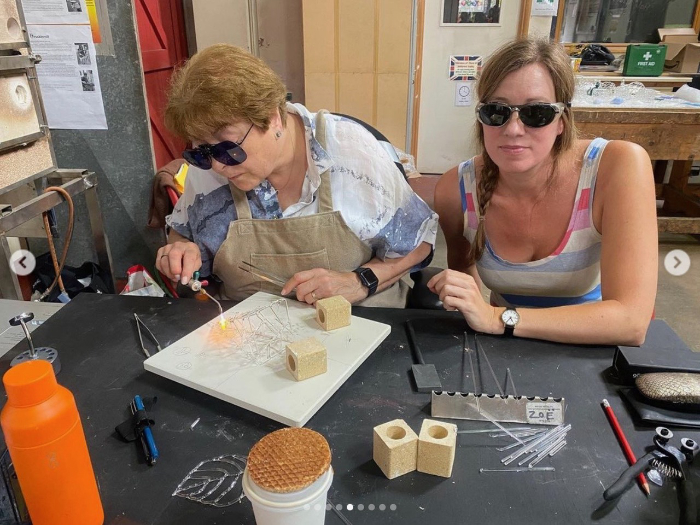
Deaf-led BSL promotional video and tours
Disability and Inclusion pilot project Masterclass participant and Deaf artist Olivier Jamin is experienced in delivering deaf-led tours for galleries. We asked him to deliver Deaf-led BSL festival tours and commissioned him to make videos to promote them and the Festival to d/Deaf visitors.
In consultation with Olivier and the BSL interpreters we decided to run two 2-hour Deaf-led/BSL tours over the Festival weekend.
Although primarily aimed at Deaf visitors, Olivier was open to anybody attending the tours and did have other people tagging along.
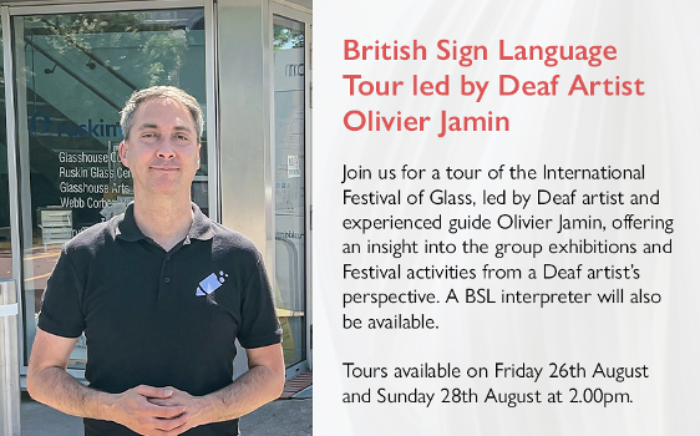
BSL interpreters on site
BSL interpreters were provided for the Biennale Private View speeches and the announcement of Biennale awards. We consulted with Olivier about how many BSL interpreters should be provided over the Festival weekend. We were not sure how many deaf visitors would attend. With two 2-hour deaf-led tours on Friday and Sunday, we decided to have two more BSL interpreters on site on Saturday and Sunday. Some demos had BSL interpreters because Olivier was interested in seeing them and we advertised these events on the website. For these demos we were able to get some information/text in advance, which was helpful for the interpreters. Olivier was keen that the BSL interpreters would also be floating at the event and available for requests on the day. This was excellent for deaf visitors to have choice, but difficult for interpreters who might have to interpret a technical demo with no advance information. We felt that, by choosing some demos in advance and having floating BSL availability for part of the time, we reached a balance.
Wheelchair-Accessible Glassblowing
The Festival received capital to make the site more accessible and this included some adaptations to glassblowing and flame working equipment. Two free sessions were offered for wheelchair-accessible glass blowing (two participants in each session) with experienced glass artists Nikki Williams and Corrina Field.
Panel Discussion
We included a panel discussion in the Festival programme called ‘Access in Glass Studios and the Art of Creative Enabling’. Panel members were Mandy Fowler (project evaluator and chair), Tanya Raabe-Webber (Disabled artist and Creative Enabler trainer), Cathryn Shilling (Disabled artist and Masterclass participant), Ben Wright (Artistic Director of Pilchuck Glass School, US), Ann Potter (Disabled artist, US) and Phillip Hickok (artist and Creative Enabler, Denmark).
Live Audio-Described Tour
In collaboration with British Glass Biennale curator Matt Duran we selected 10 works that could be touched during a live audio-described tour.
Website information
An access page was available on the website with links to it from all the other pages.
Deaf-led BSL tour at Collect exhibition
Olivier Jamin was contracted to deliver a deaf-led BSL exhibition tour of the Expanding Horizons exhibition at Collect Art Fair, Somerset House, London, in March 2023.
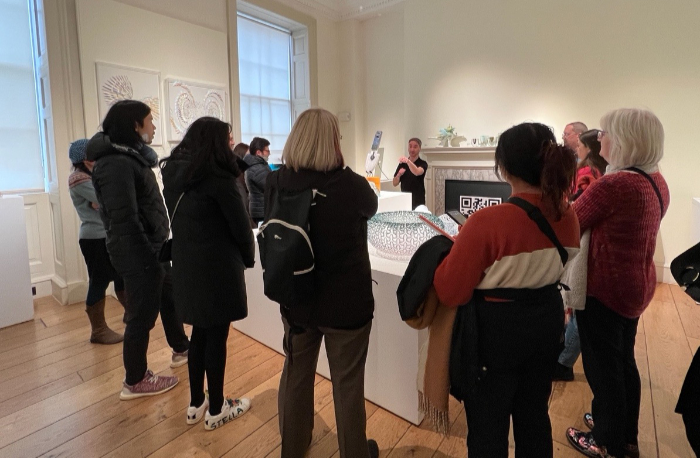
Successes
During the Creative Enabler training the introduction of the Social Model of Disability was a new concept for some of the disabled artists.
The Festival was able to support disabled artists who had previously requested access support.
Other people with access requirements came forward to discuss their own needs as a result of a letter being sent out to Masterclass participants about the pilot project.
Other Masterclass participants were very supportive of the disabled artists and welcomed this initiative.
Masterclass leaders and disabled artists were introduced before the start of the class.
Decisions were made in consultation with disabled people.
A total of 17 d/Deaf visitors were assisted by the BSL interpreters and attended the tours during the Festival weekend. Hearing people who attended found the tours very interesting.
Providing an email address to contact for further information about the accessible events (when required) worked well.
Less successful
It was difficult to budget in advance for the personal access budget at the funding application stage, not knowing who the artists would be at that point.
Noise in workshops and wearing masks for health and safety reasons sometimes made BSL interpreting and note taking difficult.
Some last-minute information about the classes made it difficult for the disabled artists to plan in advance.
Specialist technical information was tricky for the BSL interpreter and note taker, although lists of probable terminology were prepared in advance to help.
Some decisions about events were made quite late, which meant they were advertised late and this affected attendance figures. With new knowledge of what did and did not work it will be easier to plan next time.
Providing the BSL interpreters with information in advance was sometimes difficult for speeches and festival demos.
Thoughts for the Future
The Creative Enablers are keen to be involved again. Depending on future access requirements, others could also undergo the informal training.
We have not yet decided how it will work for the next Festival in August 2024. We may need to provide requested access and perhaps provide some discounted classes. It is hard to calculate the access budget without knowing who may request access.
We are very grateful for all the useful feedback we received from the participants and will take this into account when planning the 2024 event.
The funding provided by Arts Council England covered this project as part of the overall Festival budget. The funding process was long and in two stages. Many thanks to Arts Council England for supporting this project.
Anyone thinking of making an application for a similar project should speak to their regional arts council.
This article took highlights from the longer project evaluation report.
To find out more about the Festival, check out the website and subscribe to the news updates, or follow on Facebook: International Festival of Glass, Twitter: @IFoG2022, or Instagram: @ifog2022.
Project participants
Disability and Inclusion pilot project Masterclass participants: Cathryn Shilling, Julie Coakley, Olivier Jamin andSuraya Meah.
Wheelchair-Accessible Glassblowing participants: Tanya Raabe-Webber, Liz Birch and Sindu Vijayan.
Creative Enablers: Zoe Garner, Becky Wills, Nikki Williams and Corrina Field.
Creative Enabler Trainer: Tanya Raabe-Webber.
Project Evaluator: Mandy Fowler.
Project Producer: Jaqueline Cooley.
Assistant Project Producer: Jo Newman.
Article by Jaqueline Cooley, Project Producer, Disability and Inclusion Pilot Project and International Coordinator of the International Festival of Glass.
Main feature image: Some of the artists who took part in the disability and inclusion pilot project’s wheelchair-accessible glassblowing.
